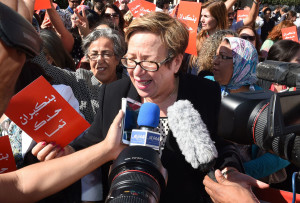Bloomberg
by Souhail Karam Caroline Alexander
Legislator and former family and social development minister Nouzha Skalli, seen here, said, “Abortion should be last recourse but this can’t be done without starting sexual education. It should be left up to the mother to decide whether to keep her child or not. The state must do its job.” Photographer: Fadel Senna/AFP via Getty Images
Morocco’s Islamist-led government has asked a panel of clerics, doctors and legislators to look into relaxing a five-decade-old abortion law that activists say is pushing more and more women into back-street terminations.
The health ministry will convene a first meeting on Wednesday to discuss changes to the law. Under consideration will be allowing procedures within six weeks in cases of rape and incest, and before the end of the fourth month if birth defects or genetic diseases are found. At the moment, abortion is banned unless there’s a threat to the woman’s life or health.
If adopted, Morocco would offer women some of the broadest legal protections in the region. Only Tunisia, which liberalized its law in 1973, the same year the U.S. legalized abortion, would have fewer restrictions. Most Muslim-majority countries draw on religious texts, colonial-era ordinances and common laws to prohibit abortion or limit it to pregnancies that threaten a woman’s life, according to the London-based solidarity network, Women Living Under Muslim Laws.
“There’s consensus among a majority of stakeholders that current legislation isn’t adequate and that it dates to 1967, a time when Moroccan society was more conservative,” said Saad-Eddine El-Othmani, a former foreign minister and deputy head of the Islamist Justice and Development Party that leads the government. “Ideas have evolved, society is changing.”
Mustapha Benhemza, a prominent cleric, was to speak at the meeting. Women’s rights activists and representatives from the World Health Organization were also invited.
Maternal Deaths
Debate over abortion in the North African nation, where King Mohammed VI is the supreme religious authority, has grown over the past few years amid a rise in botched terminations. The Rabat-based Moroccan Association for the Struggle Against Clandestine Abortion, or ACML, estimates that at least 800 abortions are being performed daily, leading to about 13 percent of all maternal deaths. There are no official figures or studies.
“The committee will first look at what French, Turkish and Belgian legislation says, then at Islamic law, and finally check with the reality on the ground before issuing any recommendations,” Justice Ministry spokesman Jaouad Ghassal said in a telephone interview in Rabat. The abortion law “could be made less stringent,” he said. The current regulations punish women undergoing an illegal abortion with prison terms of as long as two years, while doctors performing the operations can be sentenced to 20 years.
“As a doctor and a government minister, I say it’s not reasonable to keep” the existing laws, Health Minister Lahcen Ouardi said in an interview in Rabat. “Doctors, legislators and clerics must sit and talk.”
Sex Education
Alongside changes to abortion laws, the government should develop a broad agenda to educate and protect women, including from domestic violence and abuses at work, according to Nouzha Skalli, a legislator and former family and social development minister.
“Abortion should be a last recourse but this can’t be done without starting sexual education,” she said in an interview on March 8, as she marched among thousands of Moroccans in Rabat to mark International Women’s Day. “It should be left up to the mother to decide whether to keep her child or not. The state must do its job.”
The government formed the panel to consider changes to the laws after the demotion last month of Chafik Chraibi, a top Rabat obstetrician and founder of ACML, sparked protests.
Ouardi said Chraibi lost his job after he failed to respect the privacy of female patients by inviting a French TV crew into his hospital to film a documentary about illegal abortions. Still, the whole affair “had the merit of exposing” the need to urgently reform the laws, he said.
Last week, local media reported the health ministry plans to reinstate Chraibi.
El-Othmani, the JDP official, signaled that the panel wouldn’t consider allowing abortions for other reasons such as economic hardship. “What’s important is not to tackle all issues at once but to allow the legislation to evolve,” he said.
To contact the reporters on this story: Souhail Karam in Rabat at skaram5@bloomberg.net; Caroline Alexander in London at calexander1@bloomberg.net
To contact the editors responsible for this story: Alaa Shahine at asalha@bloomberg.net Mark Williams, Ben Holland








